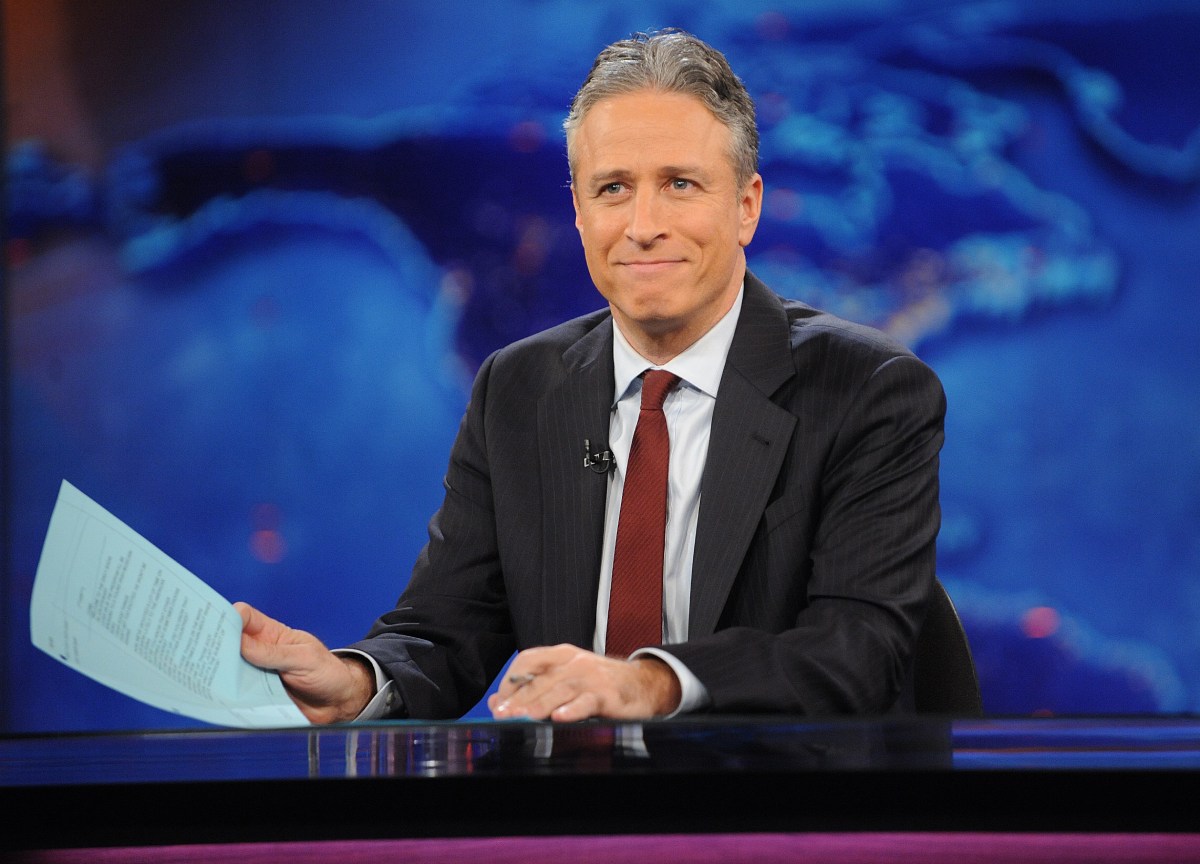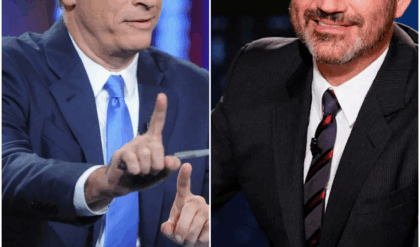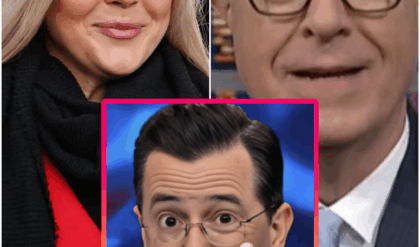Jon Stewart’s Dramatic Return: Defending Free Speech Amid Jimmy Kimmel Suspension
Late-night television has always thrived on tension — between satire and seriousness, humor and outrage, freedom and responsibility. But rarely has that tension felt as stark as it does this week. In an unplanned twist, Jon Stewart will reclaim the anchor seat at The Daily Show tonight, days earlier than expected, to address the firestorm surrounding ABC’s suspension of Jimmy Kimmel Live!
The move is more than a scheduling shuffle. It is a statement — one that touches on the future of satire, the boundaries of comedy, and the fragility of free expression in modern America.
A Sudden Crisis for Comedy
The controversy ignited after Jimmy Kimmel delivered a blistering monologue on what he called the “MAGA gang” and their response to the alleged assassin of activist Charlie Kirk. Critics accused Kimmel of implying that conservative politics bore indirect responsibility for the violence.
The fallout was swift. Affiliates like Nexstar and Sinclair Broadcasting declared they would not air Kimmel’s show, pressuring ABC to act. By September 17, Disney, ABC’s parent company, announced an “indefinite hiatus.”
The decision set off alarms across the cultural landscape. California Governor Gavin Newsom condemned it as “an attack on creative freedom.” Former President Barack Obama warned that silencing dissent under political pressure threatened the foundation of free expression itself.
Into this storm steps Jon Stewart — the comedian, cultural commentator, and former king of late-night satire whose voice carries unusual weight.

Stewart Steps In Early
Stewart was not scheduled to host until next week, part of his rotating one-night-a-week deal with The Daily Show. But producers moved quickly. Desi Lydic, originally slated for tonight’s guest spot, stepped aside so Stewart could take the chair.
The urgency is clear. Stewart intends not only to defend Kimmel as a colleague but to frame the controversy as emblematic of a broader battle: Who decides what satire can say, and where is the line between comedy and cruelty?
Insiders suggest Stewart’s monologue will combine sharp wit with sober warning, reminding audiences that satire is not frivolous entertainment but an essential form of dissent in a democratic society.
A Guest Who Knows Authoritarian Pressure
To underscore the point, Stewart’s first guest tonight will be Maria Ressa, the Nobel Peace Prize-winning journalist and CEO of Rappler. Ressa’s fearless reporting in the Philippines exposed government corruption and drew retaliation from authoritarian forces.
Her presence reframes the Kimmel controversy in global terms. This isn’t just about one host, one network, or even one country. It is about the ways governments, corporations, and public outrage can converge to silence voices.
“Maria Ressa’s career is a living reminder that when satire and journalism come under fire in democracies, the stakes go far beyond ratings battles,” said one Daily Show producer.
A Network Under Siege
Kimmel’s suspension highlights the precarious position of late-night television in today’s media landscape. Ratings for live broadcasts have been slipping for years, even as digital clips rack up millions of views online. Networks, sensitive to advertiser pressure and political polarization, are less willing to weather controversy.

That fragility was made clear when Sinclair Broadcasting demanded Kimmel issue a personal apology to the Kirk family and donate to Turning Point USA before his show could return to their affiliates. Such conditions, critics argue, blur the line between accountability and political coercion.
Even the FCC has edged into the debate. Chair Brendan Carr praised affiliates for resisting Disney content that “undermines community values,” raising fears about government influence creeping into entertainment.
Solidarity Among Late-Night Hosts
Kimmel has not stood alone. Stephen Colbert, nearing the end of his own Late Show tenure, blasted ABC’s suspension as a “blatant assault on freedom of speech.” Colbert, Kimmel, and Stewart share more than professional respect; they are friends, collaborators, and allies represented by the same longtime manager, James “Baby Doll” Dixon.
Together, they form a kind of informal coalition — a group of satirists who view comedy not just as entertainment, but as a tool to hold power to account. Stewart’s decision to intervene now is both an act of loyalty and a defense of principle.
Stewart’s Legacy as a Defender of Satire
Jon Stewart is no stranger to cultural firefights. In 2004, he famously confronted CNN’s Crossfire, accusing the program of “hurting America” with shallow, partisan bickering. The confrontation contributed to the show’s cancellation.
Over the years, Stewart has repeatedly defended colleagues when their comedy drew political fire. He supported Stephen Colbert during his Super PAC parody. He defended Samantha Bee after her controversial language about Ivanka Trump. And on his Apple TV+ series The Problem with Jon Stewart, he tackled monopolies and hypocrisy even while facing pushback from both the left and right.
His reputation ensures that tonight’s remarks will resonate far beyond Comedy Central.
What’s Really at Stake
This moment is not simply about Jimmy Kimmel’s career. It is about whether comedy can survive as a space for unfiltered critique in an era of political hypersensitivity and corporate risk-aversion.
Supporters of Kimmel argue satire must remain free, even when offensive. Critics counter that freedom of speech does not exempt comedians from consequences, particularly when jokes wound the grieving.
The debate reflects a larger culture war in America: one where every remark is scrutinized, every joke weaponized, and every broadcaster forced into impossible choices.
Why Stewart Matters Now
For audiences who grew up with The Daily Show in the 2000s, Stewart was more than a comedian; he was a guide through the noise, a satirical anchor in turbulent times. His voice still carries authority across generational and political lines.

By stepping in early, Stewart signals that this is not just a media dustup but a fight worth his credibility. His pairing with Maria Ressa ensures the conversation will expand beyond Hollywood drama into global stakes: democracy, censorship, and the boundaries of dissent.
The Future of Late-Night
Kimmel’s suspension is already one of the most consequential events in late-night history. Whether he returns, apologizes, or shifts to streaming platforms, the precedent has been set: affiliates, advertisers, and political actors now wield enormous influence over who gets to speak.
For Comedy Central, tonight is also a test. Can The Daily Show still drive the national conversation as it once did under Stewart’s reign? Can satire reclaim its role as a trusted guide in chaotic times?
A Night That May Define an Era
When Jon Stewart sits down tonight, it won’t just be another Daily Show episode. It will be a referendum on comedy’s place in democracy.
His words will echo in studios, boardrooms, and Capitol offices. His guest will remind viewers that the fight for free expression is global. And his timing — stepping in before schedule — underscores the urgency.
The suspension of Jimmy Kimmel Live! is more than a media controversy. It is a warning about the fragility of free speech in a polarized, corporate-dominated age.
Jon Stewart knows that. Tonight, he intends to make sure the rest of us do too.





